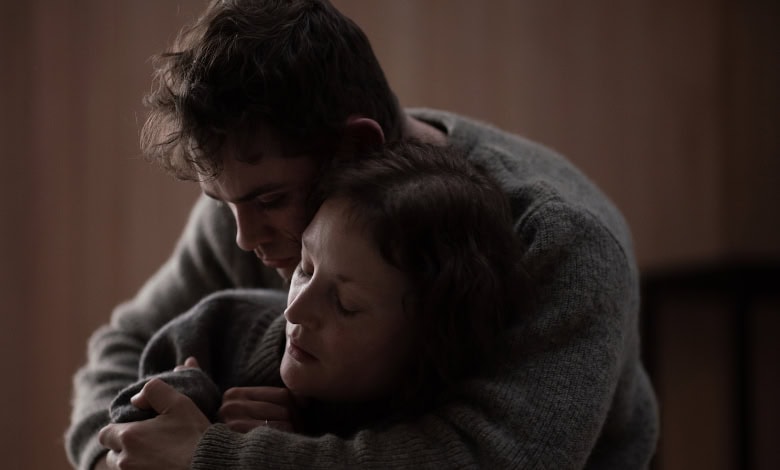
Samuel Van Grinsven’s “Went Up the Hill” is a ghost story and psychological drama that meditates on grief.
It works best as the latter and hardly at all as the former.
In a gorgeous, remote location, full of mountains and vast, empty spaces (the stunning setting is in New Zealand), a funeral is taking place. We meet the deceased’s wife, Jill (Vicky Krieps) and Jack (Dacre Montgomery), the son who was left behind and shows up unexpectedly.
After the service, Jack and Jill learn how much they have in common, their lives defined by the one who died. Their relationship becomes emotionally and physically intimate, though with a bizarre step beyond that – whenever they sleep, the soul of the departed possesses them and they’re able to have conversations with the dead.
Van Grinsven gives us a brooding, quiet start that never lets up, giving us the kind of pin-drop chamber piece that feels like the works of Ingmar Bergman. Yet, Bergman pulled us in with character insights, shocking moments of physical/verbal violence and human connections, in addition to the dream-like atmosphere.
Here, the setting is the most compelling component.
Another likely inspiration is Alfred Hitchcock’s “Rebecca” (1940), but minus Hitchcock’s visual wit and verisimilitude as a film artist. To put it another way – here is another movie about grieving and struggling to reconcile who you are, your identity, while trying to comprehend someone who seems just as present after death.
As a meditation on grief, “Went Up a Hill” is sincere but not insightful or novel. Taken as a supernatural drama, it’s slow and obvious.
The exquisite cinematography is by Tyson Perkins, who captures otherworldly vistas and creates striking, beautiful compositions. There is a painterly precision to the filmmaking. The visual beauty is the film’s greatest asset, particularly during all the exterior shots.
On the other hand, Hanan Tonwnsend’s ambient soundtrack is the kind of score that sounds like either a death wail or whale songs. Far more effective is the sound design, with crackling ice under the surface sounds of the chilly wilderness.
Why Dacre Montgomery Returned to Acting 3 Years After Stranger Things: New Movie ‘Changed My Life’ (Exclusive) https://t.co/OUinQDC16a
— People (@people) August 13, 2025
“Went Up the Hill” is intended as an exploration of what death does to the living and those who feel left behind when the departed leaves us with agonizing, unresolved questions.
This is basically a two-hander, with two excellent performances carrying this morose, slow-building drama. The result is interesting to think about afterwards, but it never pulled me in. It’s the kind of film where I’d prefer to hear why the director made it more than sitting through it again.
Van Grinsven’s film leaves such a frosty impression, I couldn’t even connect with its very-belated attempts at uplift. The ending works better as a metaphor than a proper climax, though the film as a whole functions the same way.
For a story with the tenacity to portray the invisible presence of ghosts and their ability to possess the living, what I’ll remember most are scenes of mental anguish and surviving a frozen lake over anything else.
There is poetry in the visuals and an admirable attempt to explore the pain left behind by someone who is somehow more present in death. I admire how the film is a chamber piece, but despite those strong qualities, I was all too aware of the methodical approach, and never lost myself in the film or felt anything beyond mild fascination while watching it.
The film’s classy look and presentation are impressive, though they are ultimately stronger than the film’s goals of facing mortality by accepting who we are.
Actually, if this is what catharsis looks like, the movie is enough to sway anyone from ever attending a funeral again.
Two Stars
